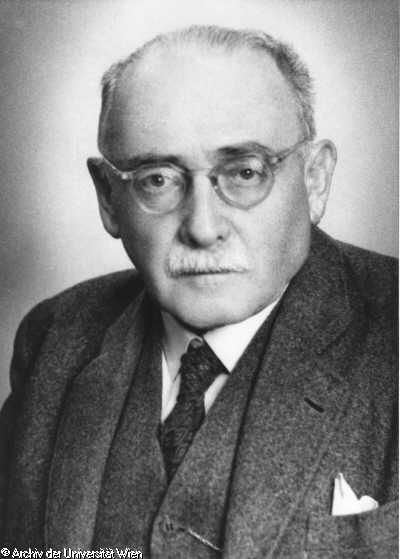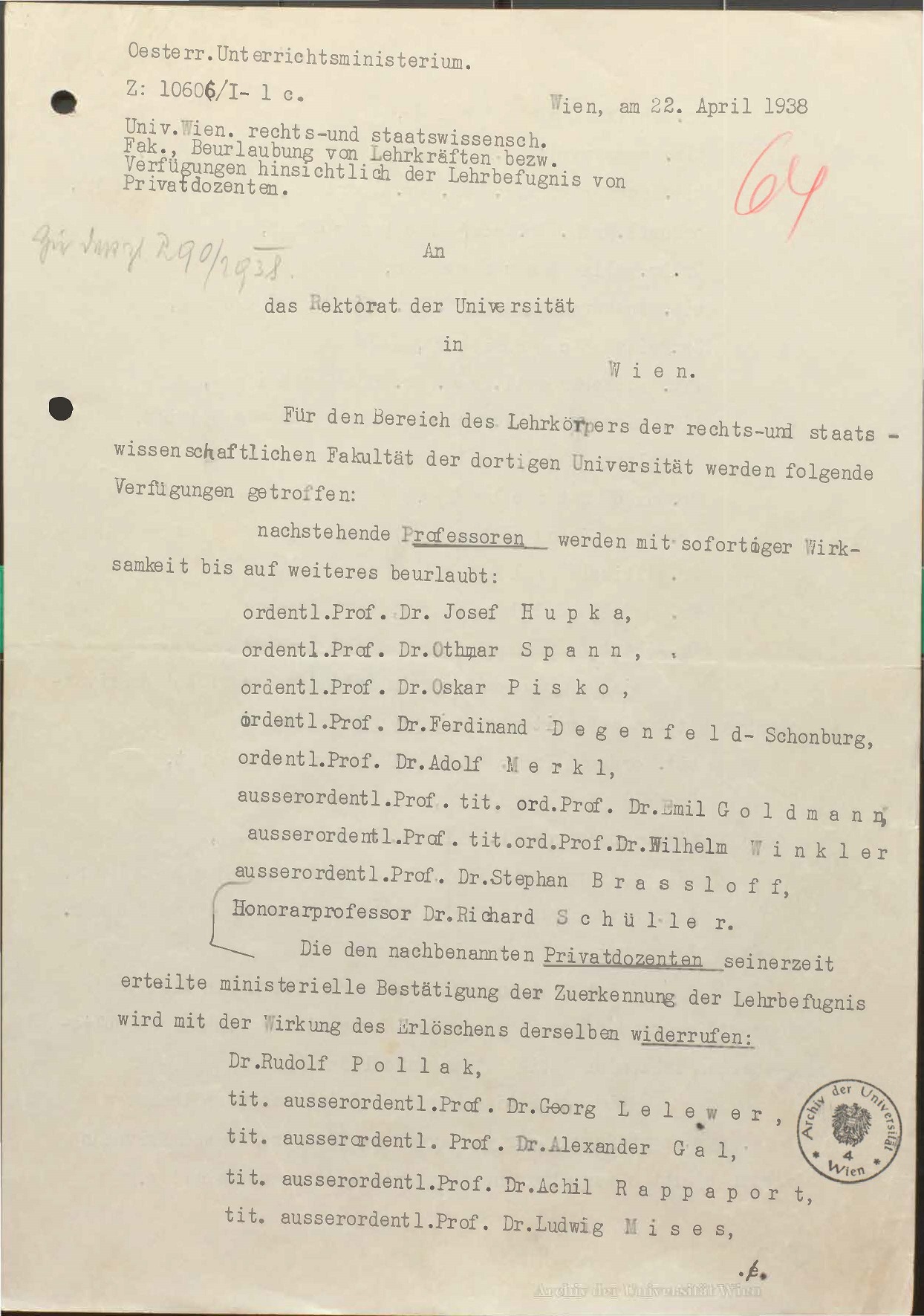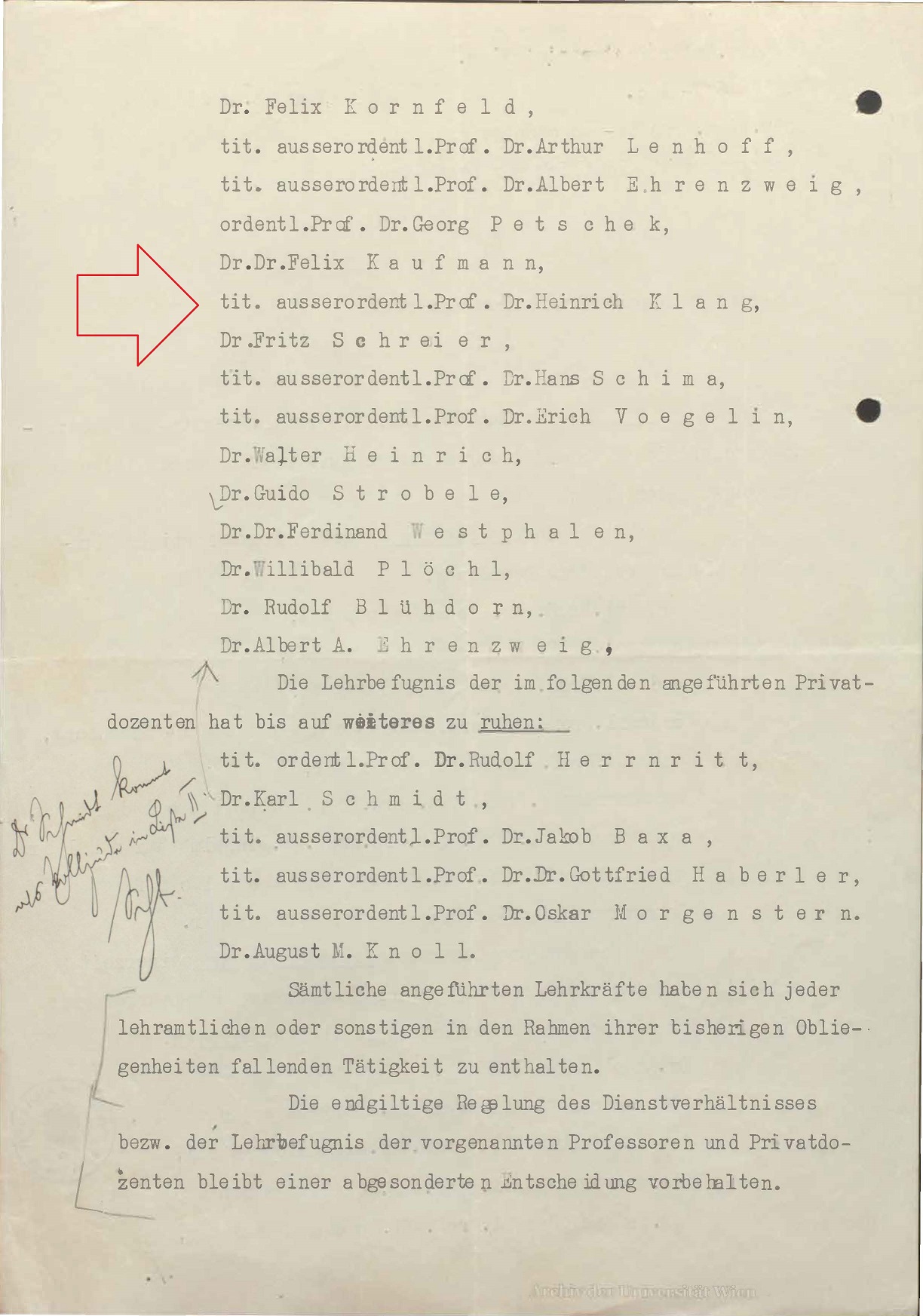
| Born: | 04-15-1875 |
| Faculty: | Law School |
| Category: | Expelled teacher |
Heinrich KLANG, born on April 15th, 1875 in Vienna/Austria as the son of General Director James Klang (1847-1914) and Karoline Klang, née Rooz (1853–1917), was private lecturer with the title of an associate professor (Pd. tit. ao. Prof.) for Austrian General Private Law at the Law School of the University of Vienna in 1938.
He was persecuted under National Socialism for racist reasons - on April 22nd, 1938, his teaching license (venia legendi) was revoked and he was removed from office and expelled from the University of Vienna.
Heinrich Klang had studied law at the University of Vienna from 1892-1897 and received his doctorate (Dr.jur.) on July 24th, 1897. After his military service he passed the judicial examination in 1901 and worked as a judge at various courts in Vienna and the surrounding area. He took part in the First World War from 1914 to 1918 - from 1916 as a military judge in Vienna - and subsequently worked as a judge at the Regional Court in Vienna and from 1926 at the Vienna Higher Regional Court (from 1928 Chairman of the Appeals Senate, from 1930 President of the Senate).
In 1923 he habilitated in civil law ("Unerschwinglichkeit der Leistung") at the University of Vienna and in 1925 received the title (but not the position) of associate professor and was editor and publisher of Juristische Blätter (1928-1938,1947-1954).
He was famous for his commentary on the ABGB|Allgemeinen Bürgerlichen Gesetzbuch which he edited from 1926 and which was published in its first edition between 1931 and 1935.
After the Nazi seizure of power, he was dismissed from the university and the court and was no longer allowed to work - and in order to secure a modest livelihood, he was forced to sell his private library of almost 10,000 volumes through antiquarian bookshops in Vienna, Leipzig, Berlin and Frankfurt/Main.
He had to flee Vienna, but despite several attempts he was unable to emigrate from Austria in time. He was arrested and deported to the Theresienstadt [Terezín/Czech Republic] ghetto, where he arrived on September 25th, 1942. There, as a prisoner, Klang was a judge at the ghetto court, which he presided over in the fall of 1944, and was also a member of the Council of Elders of the Jewish self-government in Terezín. He was one of the few surviving prisoners to appear in the Nazi propaganda film about Terezín, and was liberated by the Red Army on May 8th, 1945, returning to Vienna on July 8th, 1945. His brothers Fritz Klang (1885–1941) and the writer Marcell Klang (1876–1942) did not survive National Socialism.
In July 1945, he was reinstalled by the Allied Military Government as a judge at the Supreme Court, and from the end of November 1945 he again presided over the ordinary civil senate and, from 1947, also over a labor law senate. He received his venia legendi back and from August 1945 also taught again at the University of Vienna as an honorary professor of Austrian private law after 1945. He also fulfilled other important functions in the Jewish Community of Vienna and also as chairman of the "Supreme Restitution Commission", where he dealt with restitution issues and was instrumental in creating the legal basis for restitution.
Klang retired at the end of 1949, and in 1951 he was awarded the City of Vienna Prize for the Humanities.
Prof. Heinrich Klang died in Vienna on January 22, 1954.
In 2021/22, in the course of Nazi provenance research at the University Library of Vienna, 42 books from the former library of Heinrich Klang (with the ExLibris of his father James Klang) were identified in the holdings of three Austrian university libraries and five German libraries and were restituted to his heirs* on December 13, 2022. They planned to donate them to the library of the Supreme Court in 2023.
Lit: Archives of the University of Vienna/enrollment foms ("Nationale") IUR, graduation registry ("Promotionsprotokoll") IUR 1889-1897, No. 1525, war time diary 151.271, personnel record J PA 334, S 304.609, J Cur 329/I (=GZ 1177 ex 1954), Rectorate GZ 677 ex 1937/38; Heinrich KLANG, in: Nikolaus Grass, ed., Österreichische Rechts. und Staatswissenschaften der Gegenwart in Selbstdarstellungen, Innsbruck 1952, 117–135; STADLER I 2004 [1987], 226, 296; MUEHLBERGER 1993, 14; BLUMESBERGER 2002, 680; Günter GÖßLER u. Martin NIKLAS, Heinrich Klang: Praxis und Theorie – Verfolgung und Rückkehr, in: Franz Stefan Meissel, Thomas Olechowski Ilse Reiter-Zatloukal u. Stefan Schima, ed., Vertriebenes Recht – vertreibendes Recht. Die Wiener Rechts- und Staatswissenschaftliche Fakultät 1938-1945, Vienna 2010, 281–300; Franz-Stefan MEISSEL, Thomas OLECHOWSKI u. Christoph GNANT: Untersuchungen zur Praxis der Verfahren vor den Rückstellungskommissionen. The Proceedings before the Austrian Restitution Commissions. Vienna 2004; OLECHOWSKI/EHS/STAUDIGL-CIECHOWIC 2014 ; 359-361; wikipedia; Theresienstadt-Lexikon; university library provenance research an restitution 2022; kind remarks by Oswald Glaser, Vienna 2015 and by Prof. Markus Stumpf, Vienna 12/2022.
Herbert Posch

